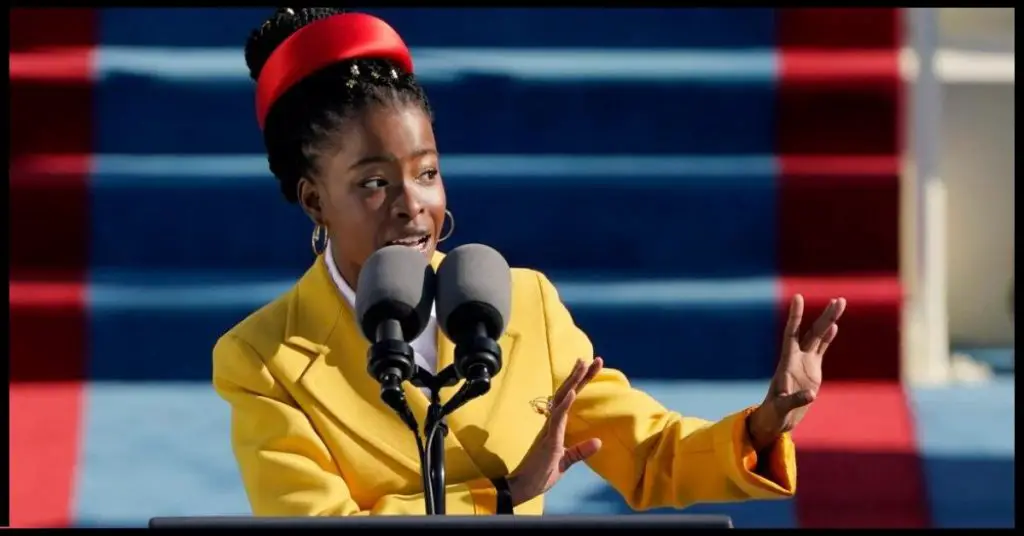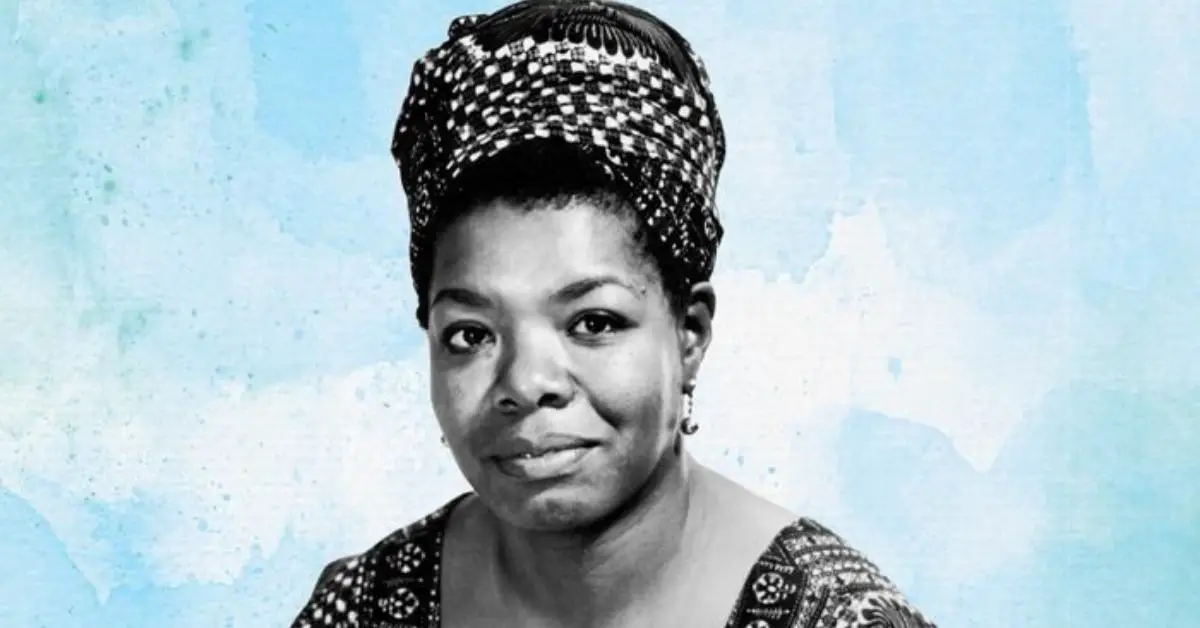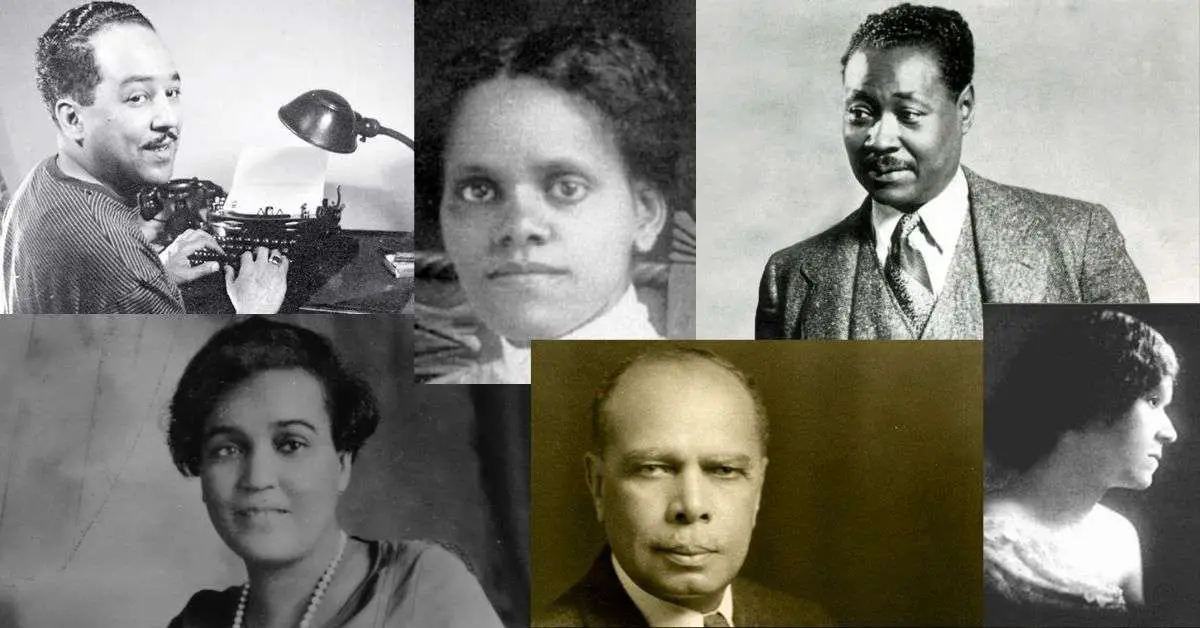Amanda Gorman Poems

Amanda Gorman is a young, talented New York Times bestselling poet who rose to prominence after performing at the presidential inauguration of Joe Biden in January 2021.
This youngest National Youth Poet Laureate powerful words and distinctive voice have won many fans, and her debut poetry collection, “The Hill We Climb,” has become a best-seller.
In this post, we’ll look at five of Amanda Gorman poems most inspiring poems, which have helped her rise to fame.
Table of Contents
Affiliate Disclaimer: This content contains affiliate links. When you buy through these links, I may earn an affiliate commission.
1. The Hills We Climb
This is one of the inaugural poet most famous poems, which was read at the presidential inauguration.
This poem celebrates the American people’s resilience in the face of adversity and encourages unity and hope for a better future.
Gorman reminds us, through powerful imagery and a moving message, that we can overcome any obstacle if we work together as one.
Read the full poem below:
When day comes we ask ourselves, where can we find light in this never-ending shade? The loss we carry, a sea we must wade. We've braved the belly of the beast, We've learned that quiet isn't always peace, and the norms and notions of what just is isn't always just-ice. And yet the dawn is ours before we knew it. Somehow we do it. Somehow we've weathered and witnessed a nation that isn't broken, but simply unfinished. We the successors of a country and a time where a skinny Black girl descended from slaves and raised by a single mother can dream of becoming president only to find herself reciting for one. And yes we are far from polished. Far from pristine. But that doesn't mean we are striving to form a union that is perfect. We are striving to forge a union with purpose, to compose a country committed to all cultures, colors, characters and conditions of man. And so we lift our gazes not to what stands between us, but what stands before us. We close the divide because we know, to put our future first, we must first put our differences aside. We lay down our arms so we can reach out our arms to one another. We seek harm to none and harmony for all. Let the globe, if nothing else, say this is true, that even as we grieved, we grew, that even as we hurt, we hoped, that even as we tired, we tried, that we'll forever be tied together, victorious. Not because we will never again know defeat, but because we will never again sow division. Scripture tells us to envision that everyone shall sit under their own vine and fig tree and no one shall make them afraid. If we're to live up to our own time, then victory won't lie in the blade. But in all the bridges we've made, that is the promise to glade, the hill we climb. If only we dare. It's because being American is more than a pride we inherit, it's the past we step into and how we repair it. We've seen a force that would shatter our nation rather than share it. Would destroy our country if it meant delaying democracy. And this effort very nearly succeeded. But while democracy can be periodically delayed, it can never be permanently defeated. In this truth, in this faith we trust. For while we have our eyes on the future, history has its eyes on us. This is the era of just redemption we feared at its inception. We did not feel prepared to be the heirs of such a terrifying hour but within it we found the power to author a new chapter. To offer hope and laughter to ourselves. So while once we asked, how could we possibly prevail over catastrophe? Now we assert, How could catastrophe possibly prevail over us? We will not march back to what was, but move to what shall be. A country that is bruised but whole, benevolent but bold, fierce and free. We will not be turned around or interrupted by intimidation, because we know our inaction and inertia will be the inheritance of the next generation. Our blunders become their burdens. But one thing is certain, If we merge mercy with might, and might with right, then love becomes our legacy, and change our children's birthright. So let us leave behind a country better than the one we were left with. Every breath from my bronze-pounded chest, we will raise this wounded world into a wondrous one. We will rise from the gold-limbed hills of the west. We will rise from the windswept northeast, where our forefathers first realized revolution. We will rise from the lake-rimmed cities of the midwestern states. We will rise from the sunbaked south. We will rebuild, reconcile and recover. And every known nook of our nation and every corner called our country, our people diverse and beautiful will emerge, battered and beautiful. When day comes we step out of the shade, aflame and unafraid, the new dawn blooms as we free it. For there is always light, if only we're brave enough to see it. If only we're brave enough to be it.
2. In This Place (An American Lyric)
“In This Place (An American Lyric)” is another of Gorman’s most inspiring poems.
This poem is about the beauty and diversity of America, as well as the potential for unity within our country.
Gorman’s use of imagery and metaphors paints a vivid picture of America, and her message of hope and inclusion is deeply moving. Read the full poem below:
There’s a poem in this place— in the footfalls in the halls in the quiet beat of the seats. It is here, at the curtain of day, where America writes a lyric you must whisper to say. There’s a poem in this place— in the heavy grace, the lined face of this noble building, collections burned and reborn twice. There’s a poem in Boston’s Copley Square where protest chants tear through the air like sheets of rain, where love of the many swallows hatred of the few. There’s a poem in Charlottesville where tiki torches string a ring of flame tight round the wrist of night where men so white they gleam blue— seem like statues where men heap that long wax burning ever higher where Heather Heyer blooms forever in a meadow of resistance. There’s a poem in the great sleeping giant of Lake Michigan, defiantly raising its big blue head to Milwaukee and Chicago— a poem begun long ago, blazed into frozen soil, strutting upward and aglow. There’s a poem in Florida, in East Texas where streets swell into a nexus of rivers, cows afloat like mottled buoys in the brown, where courage is now so common that 23-year-old Jesus Contreras rescues people from floodwaters. There’s a poem in Los Angeles yawning wide as the Pacific tide where a single mother swelters in a windowless classroom, teaching black and brown students in Watts to spell out their thoughts so her daughter might write this poem for you. There's a lyric in California where thousands of students march for blocks, undocumented and unafraid; where my friend Rosa finds the power to blossom in deadlock, her spirit the bedrock of her community. She knows hope is like a stubborn ship gripping a dock, a truth: that you can’t stop a dreamer or knock down a dream. How could this not be her city su nación our country our America, our American lyric to write— a poem by the people, the poor, the Protestant, the Muslim, the Jew, the native, the immigrant, the black, the brown, the blind, the brave, the undocumented and undeterred, the woman, the man, the nonbinary, the white, the trans, the ally to all of the above and more? Tyrants fear the poet. Now that we know it we can’t blow it. We owe it to show it not slow it although it hurts to sew it when the world skirts below it. Hope— we must bestow it like a wick in the poet so it can grow, lit, bringing with it stories to rewrite— the story of a Texas city depleted but not defeated a history written that need not be repeated a nation composed but not yet completed. There’s a poem in this place— a poem in America a poet in every American who rewrites this nation, who tells a story worthy of being told on this minnow of an earth to breathe hope into a palimpsest of time— a poet in every American who sees that our poem penned doesn’t mean our poem’s end. There’s a place where this poem dwells— it is here, it is now, in the yellow song of dawn’s bell where we write an American lyric we are just beginning to tell.
3. The Miracle of Morning
Amanda Gorman’s “The Miracle of Morning” is a poem about the wonder and power of a new day. Gorman’s descriptive language evokes awe and wonder, and her message of hope and renewal is truly inspiring.
This poem serves as a reminder to appreciate the little things in life and to always look for the beauty in our surroundings. Read the full poem below to appreciate the message:
I thought I’d awaken to a world in mourning. Heavy clouds crowding, a society storming. But there’s something different on this golden morning. Something magical in the sunlight, wide and warming. I see a dad with a stroller taking a jog. Across the street, a bright-eyed girl chases her dog. A grandma on a porch fingers her rosaries. She grins as her young neighbor brings her groceries. While we might feel small, separate, and all alone, Our people have never been more closely tethered. The question isn’t if we will weather this unknown, But how we will weather this unknown together. So on this meaningful morn, we mourn and we mend. Like light, we can’t be broken, even when we bend. As one, we will defeat both despair and disease. We stand with healthcare heroes and all employees; With families, libraries, schools, waiters, artists; Businesses, restaurants, and hospitals hit hardest. We ignite not in the light, but in lack thereof, For it is in loss that we truly learn to love. In this chaos, we will discover clarity. In suffering, we must find solidarity. For it’s our grief that gives us our gratitude, Shows us how to find hope, if we ever lose it. So ensure that this ache wasn’t endured in vain: Do not ignore the pain. Give it purpose. Use it. Read children’s books, dance alone to DJ music. Know that this distance will make our hearts grow fonder. From a wave of woes our world will emerge stronger. We’ll observe how the burdens braved by humankind Are also the moments that make us humans kind; Let every dawn find us courageous, brought closer; Heeding the light before the fight is over. When this ends, we’ll smile sweetly, finally seeing In testing times, we became the best of beings.
4. Ship’s Manifest
Ship’s Manifest by Amanda Gorman is a nuanced and multilayered critique of America’s current sociopolitical landscape.
Gorman elegantly weaves her personal experience with her predecessors’ historical narratives to create an insightful analysis of how history has shaped our understanding of power and privilege.
The poem’s use of imagery and poetic devices emphasizes its critical stance on current issues such as systemic racism, inequality, and injustice. Read the poem below:
Allegedly the worst is behind us. Still, we crouch before the lip of tomorrow, Halting like a headless hant in our own house, Waiting to remember exactly What it is we’re supposed to be doing. & what exactly are we supposed to be doing? Penning a letter to the world as a daughter of it. We are writing with vanishing meaning, Our words water dragging down a windshield. The poet’s diagnosis is that what we have lived Has already warped itself into a fever dream, The contours of its shape stripped from the murky mind. To be accountable we must render an account: Not what was said, but what was meant. Not the fact, but what was felt. What was known, even while unnamed. Our greatest test will be Our testimony. This book is a message in a bottle. This book is a letter. This book does not let up. This book is awake. This book is a wake. For what is a record but a reckoning? The capsule captured? A repository. An ark articulated? & the poet, the preserver Of ghosts & gains, Our demons & dreams, Our haunts & hopes. Here’s to the preservation Of a light so terrible.
5. Making Mountains As We Run
“Making Mountains As We Run” is an ode to those who seek justice that speaks to the power of collective action.
Gorman’s personal experience as a young Black woman navigating racism and sexism while searching for hope in the midst of chaos informs the work.
She captures the pain and resilience of marginalized people’s struggles through vivid imagery.
She encourages readers to consider how their own actions can effect change and to stand in solidarity with those facing systemic oppression by presenting these realities in poetic form.
See the full poem below:
How would we read the Harvard arms, If we took another look? The letters of veritas, Tossed across Three open books, Like eight simple seeds? I’d saywe can read this creed Not just in the words, but in the deeds Of the man we celebrate today. A man of exemplary mind, Who is also exceptionally kind. Yet before these accolades and degrees, He grew up in Pontiac, Michigan. The son of two refugees who immigrated to America: Two fighters who came here looking shoreward, Two survivors dreaming higher, looking forward At the new opportunities their son could seize. It’s apparent President Bacow Got the best from both his parents; Like his mother, he’s characteristically optimistic. Like his father, he speaks with integrity, sincerity, clarity; He is both outstandingly honest And marvelously modest. Being raised by parents who’d witnessed oppression’s worst Is what makes President Bacow so well-versed In the American dream. It speaks to his personality, But also the fact that this dream is his reality. I only needed to speak with him for two minutes Before I knew why he is in it: Tikkun olam, to repair the world. He knows that to repair it is to share its Freedoms and dreams, especially at a university Dedicated to excellence through diligence, daring and diversity. President Bacow knows Harvard is not a place: It is an idea, which also can be a face Of higher education, where every day we make The unknown perceivable and the impossible achievable, We know if we are to be a school With a purpose we teach for, we must ask more of ourselves and our world. Because great ideas don’t just unfurl; They must be sought out, Not just thought out, But brought out Of the best of ourselves. Because, in fact, Veritas is to act. It’s this commitment in everything we do That makes our work here Both tremendous and true. Our motto far heard at Harvard, Pushing us forever forward, Toward the pursuit of truth at its most Transformative and tenacious, audaciously Seeking it not just in Widener’s shelves But also inside our wiser selves. If you ask President Bacow’s wife of 43 years, Adele You’ll hear her tell that he’s always ready for the next adventure, That it’s not simply a gesture When he says: “Call me Larry”. He understands we are all comrades who carry The very weight of getting to create the world here, This extraordinary gathering of legendary luminaries and visionaries. President Bacow knows now is not the time to back out The present is to act out of purpose, allow our service To serve an us far greater than the yard. The question is hard, But how should we read our school’s creed? When the mind is freed, when we take another look, We see that the books are open, The silence of a blank page broken By truth being shared, written, spoken. Meaning we can both learn new truths as we are teaching, We can give answers as we are reaching for questions Which suggests veritas is not in the knowing, but in the growing Into both a truth seeker and truth speaker, Meaning we can make mountains as we run, As long as we climb towards veritas as one Harvard, meaning we can shape the sea as we sail And the only way to fail is to not learn from the journey, And the only way to triumph is to share what we know to be true. And so I ask you to join me as we witness and welcome The man who reminds of us of the veritas we can all find, The man who loves Harvard, but whose love is not blind:, The honest, the very brave and of exemplary mind, The man whose truth will change our community, our country, And our kind: Lawrence S. Bacow, the 29th President of Harvard University.
Final Thoughts on Amanda Gorman Poems
Finally, Amanda Gorman’s meteoric rise from a powerful performance at the presidential inauguration to bestselling author is truly remarkable.
Her poetry exemplifies the power of words and their ability to change the world. Her work serves as a reminder of the value of representation and the influence that diverse voices can have on the literary landscape.
The five poems highlighted in this blog post are only a small sample of Gorman’s talent, and it is clear that she is a literary force to be reckoned with.
We are excited to see her continued growth and impact in the coming years.

